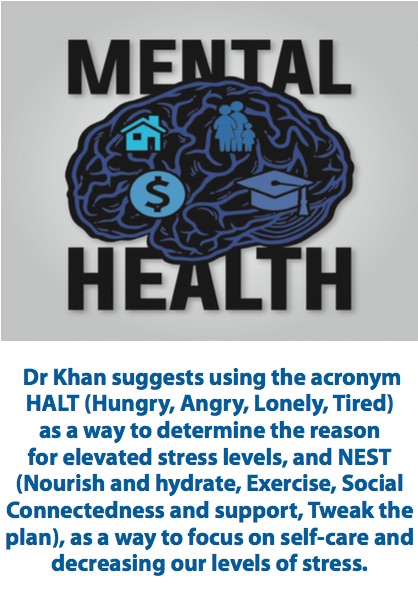
Coronavirus. COVID-19. SARS-CoV-2.
Whatever you call it, we all know that it has changed our lives. A simple trip to the grocery now includes dressing for maximum protection (long outer wear and masks), choosing the time when the lines outside are shortest, as well as a serious decontamination exercise when you return home.
Simple pleasures, stressful. Now, we work from home. Now, we may not have a job to go back to. Now, we discover whether we are essential or not. In an instant we have become cooks, teachers, home maintenance, unemployed, underemployed... and the list goes on. How are we existing in this new world? How is our mindset, our motivation, our mood; our mental health?
“The first thing to understand is that this crisis is unprecedented,” says Dr Katija Khan, Clinical Psychologist in the Department of Clinical Medical Sciences at UWI St Augustine’s Faculty of Medical Sciences. “It is nothing like we have ever experienced so we are all at heightened levels of stress. We need to recognise how we are dealing with stress and what we need to do to help cope with it.”
Dr Khan, who is also a member of The UWI COVID-19 Task Force, has stated that stress can have a range of effects including: psychological (eg mood changes toward anxiety, irritability and agitation), physical (eg body aches, fatigue, muscle tensions), cognitive (eg changes in concentration, attention), and social/ behavioural (eg withdrawal from others, overuse of caffeine or alcohol). Given the pandemic-induced heightened stress levels we may all need to take a mental health “temperature check”. If these stress responses are taking a toll on several areas in your life, it is time to reach out and seek help.

“Getting help is a very brave and healthy thing to do in times like these,” says Dr Khan. She recommends some strategies for people to assess their stress levels, and others to help them cope. She suggests using the acronym HALT (Hungry, Angry, Lonely, Tired) as a way to determine the reason for elevated stress levels, and NEST (Nourish and hydrate, Exercise, Social Connectiveness and support, Tweak the plan), as a way to focus on self-care and decrease our levels of stress.
For those that thrive on social interaction, social distancing may have taken a greater toll on their mental health. Dr Khan gives some support strategies which include cognitive reframing (reframing isolation into something positive) as well as behavioural strategies (staying socially connected by using technology). There also needs to be a reassessment of expectations and notions about productivity for workers and employers.
“Working from home is not the same as working from home in a crisis,” Dr Khan warns. Employers need to be aware of the potential challenges their employees may be facing and assess what is the best fit when it comes to standards of productivity. Make it easy for your staff to open up to you about the challenges they are having, taking care to being kind, considerate and confidential.
As we all live through this uncertain time, we should allow ourselves downtime to cope. Reach out to someone who can support you, or support someone you have noticed may be having a hard time. Humans are hard-wired for connection and being made to physically disconnect, not only from the things we love, but the people we love, can take some getting used to. Be kind. Seek help, and focus on getting through each day mentally healthy.